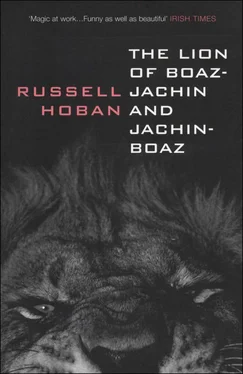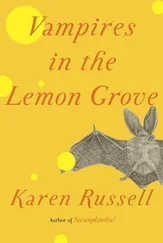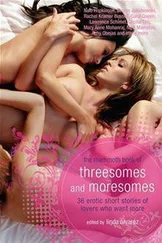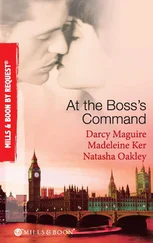Boaz-Jachin climbed the hill and sat there, looking out over the lion-coloured plain, dotted now with children and grown-ups photographing one another, eating sandwiches and drinking soft drinks. The grown-ups looked at maps of the citadel and pointed in various directions. The children spilled food and drinks on their clothes, quarrelled among themselves, ran, walked, and jumped violently and at random. Their voices rose in a thin haze like the smell of old cooking in a block of flats. The heat shimmered over the plain, and Boaz-Jachin fancied that he could see in the air the running of the lions, tawny, great, quickly gone. He felt in him the dying lion biting the wheel. By letting go of everything else he could let himself be with the lion.
And being with the lion he tasted in him, raging, the memory of the trap and the fall, the blue oblong of sky above him, the dark faces looking down into the pit, the heavy corded meshes of the net that came down over him and clung and smothered and made impotent his rage. Dark of the pit, blue of the sky, and the peering dark faces of little dark men who were outlanders everywhere, the little dark men who read the wind, who read the earth they walked on. When they hunted they looked from side to side and sniffed the air. In the invisible air that held the spirits of beasts living and dead they felt with quick strong fingers, and they pulled out like a long thread the spirit of the animal they would trap. The lion could kill them with a blow of his paw if they would stand before him, but they were too cunning. The lion was as a child to them.
The memory of the heavy cage-wagons was in Boaz-Jachin, the jolting and the dryness and the thirst. Then the wooden cages on the plain and the other little cages atop them in which the little dark cunning men perched like birds. With poles they opened the cage doors and sent the lions out in the heat of the day to the place of their death.
The lions came out of the cages slowly, snarling and lashing their tails. They crouched, growling while the beaters and their dogs advanced to make them go forward to be hunted by the king. The dry wind offered chaos only. The dry wind sang the hunter hunted, the last kill far behind. The dry wind roared and raged, clashed spears on shields, bayed in the mastiff throats, sang in bowstrings death, death, death.
The lions were out on the plain. Beaters and dogs and spearmen and men with shields made walls they could not break through, could not overleap. The chariots were rolling on their tall wheels and the king was shooting arrows, sending death among the lions.
The lions were brave, but there was no chance for them. If they had had a king he would have led them against the king of the chariots and horses. But they had no time to choose a lion-king. The chariots were among them, with spearmen and bowmen to guard their king and give death to every lion.
The last lion alive was the one whom the others would have made their king if they had been allowed to. He was large, strong, and fierce, and with two arrows deep in his spine he was still alive. The arrows burned like fire in him, his sight was fading, the blood was roaring in his ears with the rumble of the chariot wheels. Before him and above him, racing away, the glittering king was calm in his chariot, his spear poised, his spearmen beside him. The dying lion-king leaped, clung to the tall and turning wheel that brought him up to the spears. Growling and frowning he bit the wheel that lifted him and bore him on to darkness.
The lion was gone. Where the lion had been was a sudden empty giddy blackness, like the sensation produced by straightening up too quickly after bending down for a long time.
Boaz-Jachin was aware of people again, taking photographs, eating sandwiches, drinking soft drinks. He listened for ghostroars behind the voices, heard only the seethe of absence in the hollow of the silence, as one might hear the sea in a shell.
‘There are no lions any more,’ said Boaz-Jachin.
He thought about his father and the map that he had taken away. What might have been his for the finding if Jachin-Boaz had not taken the beautiful map for himself! He, son of the map-seller, map-maker, map-lover, had no talent for maps, could not make one that was not stupid and ugly and disfigured, and this was his father’s way of punishing him — to leave him mapless and alone with his deserted mother, stuck in a dark shop like an old man, waiting for the bell to jingle at the door, waiting to sell the means of finding to other seekers.
Boaz-Jachin had in his rucksack, along with his clothes and his unfinished map, a pencil, some paper, and a small ruler. He went back to the hall of the lion hunt, alone among the people all around him. He measured carefully the dying lion who was leaping up at the king’s chariot. He measured the visible parts of the arrows in the lion, measured also the spears of the king and the king’s spearmen. In another part of the same relief was an arrow that transfixed a dying lioness. Both ends of the arrow being visible, Boaz-Jachin was able to measure its full length. He wrote down all his measurements, folded the paper carefully and put it in his pocket.
He left the lion-hunt hall and went out to the high mound, the spectator’s hill. There he sat for a long time. When Boaz-Jachin had taken the money from the cash box in the office he had thought that he would not be coming back to the shop. He had seen himself, a lone wanderer, playing his guitar in the street, the case open on the pavement for passers-by to drop money into. But in the wordless refusal of the ruins about him, in the remembered sound of last night’s roadside stones under his feet, he had heard the silence of unreadiness.
He had been with the lion. He had that. That had come to him, and something had made him measure the image of the lion and the images of the spears and arrows. He did not know why he had done it. Something more might come to him. He had come to this place to find what to do next, and at least he had found what not to do next: he would not search for his father now. He would go back to the shop for the present.
At the souvenir stand near the gates Boaz-Jachin bought a photograph of the lion-hunt relief that showed the dying lion leaping up at the king’s chariot and biting the turning wheel. Then he bought a sandwich and an orange drink. When the bus came he went back to the town, and from there he took the next bus back to his town.
It was late at night in the city where Jachin-Boaz lived now. He lay awake looking at the pinky-grey night sky framed in his windows. Always in the night sky here was the reflected glow of the great city. He moved his arm to light a cigarette, and the girl who lay with her head on his chest rolled over in her sleep, trailing her hand down his body. Gretel. He said her name in his mind, leaned over to look at her sleeping face, turned back the blankets to admire the graceful length of her, smiled in the dark, covered her again.
Jachin-Boaz watched the smoke drift in the dimness of the room. He thought of stories, fairy tales from his childhood, in which a young man went out to seek his fortune in the wide world. Always the father was dead at the beginning of the story, and the young man went out with his few coins, his crust of bread, his fiddle or his sword. Sometimes he found or won some magic thing along the way. A map, perhaps. Jachin-Boaz bared his teeth in the dark but did not smile.
Now he, Jachin-Boaz, was the old man out in the wide world seeking his fortune, the old man who wanted a new story and would not agree to be dead. The young man was left at home to be a shopkeeper and the companion of his deserted mother. Jachin-Boaz saw in his mind his wife’s face, looked away and saw the face of his son Boaz-Jachin outside the shop window, shaded by the awning, looking into the shadows at his father and smiling.
Читать дальше












